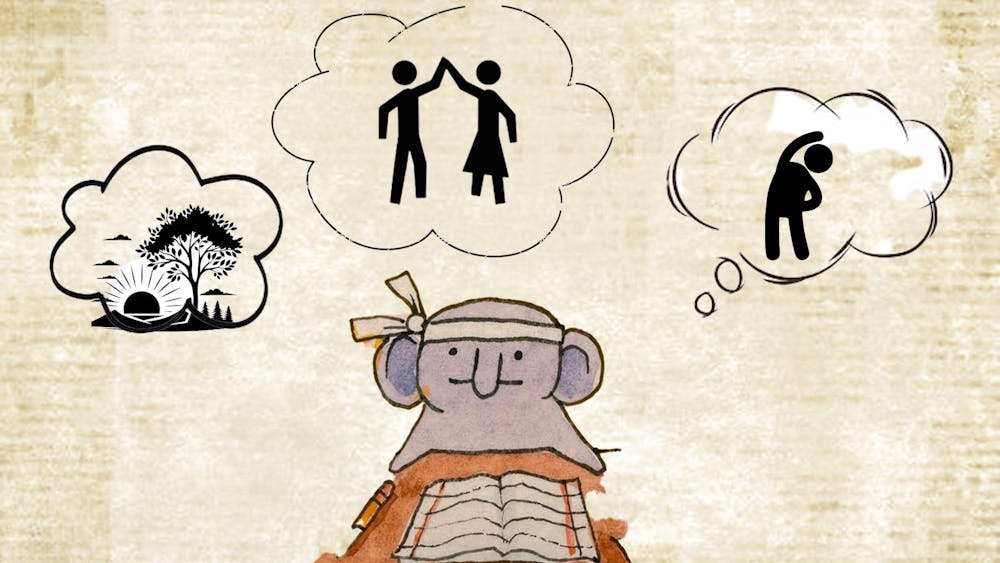Auditioning for the Humor Artists in the fall of 2014 — as an SMC junior returning from a year abroad — was a leap for me. I’m typically one of the quieter theater types (yes, there is such a thing!), and the idea of getting up without a script in front of an audience that expected to be amused was intimidating. I guess after a year in Italy, I thought I could do anything or some nonsense like that, so I gave it a shot. If I had the gift, then great! If not, oh well.
I’m not sure who was more surprised when the Humor Artists let me in — me, or my mom — but I soon learned that improv comedy is not a “you-either-get-it-or-you-don’t” activity. It requires some natural inclinations, I suppose — mainly the absurd desire to make lots of people laugh at the same time, more or less on purpose. But once you’ve joined an improv team or signed up for a class, that’s when the learning begins, lots of it. And for me, it’s been a very gradual process of developing the skills of observation, timing and scene structure. But improv requires a lot more of me than that. It requires confidence, trust, courage, a willingness to fail and faith that that won’t happen. It demands listening to my teammates, respecting their choices, expanding on others’ ideas and learning when to lead and when to follow. It takes a certain way of relating with others — teammates and audience members — for the art form to function.
Fortunately, improv teaches what it demands and can foster growth in all who give it a shot. The Humor Artists, being a very large team, dedicate much of their energy to making this growth happen for their team members. But if you’re not in the Humor Artists, you can still bring improvisational psychology into your life with two words: “Yes, and … ”
For an improviser, “Yes, and … ” is “let there be light” and the Golden Rule combined. It’s the essence of improvising with others, and it’s the foremost commandment: Always, always affirm and expand your partner’s ideas. Negate (“No”), and the scene dies. Qualify (“Yes, but … ”), and the scene loses its balance. Affirm and expand (“Yes, and … ”), and the scene grows into something new: a partnership, a co-authored story with mutual give and take. The point is to create a great experience for improviser and audience alike: no room for being a diva or for being unconfident when your teammates are depending on you! You’re up there to make each other look good (two brains are funnier than one), and to come in for the rescue whenever necessary. That’s a beautiful feeling of both safety and empowerment. And you don’t need to be onstage to bring it to life.
What if every time someone said something to you, you listened? What if you accepted others’ ideas without irony and added input of your own? What if, in your conversations, you thought about making the most out of the time and energy you were sharing with another person rather than about how you could come out on top? What if you assumed that your partners in business, school and life were there to help you, and for you to help? What would that feel like? It would feel like standing on a stage without a script in your hand, without an agenda and without a plan. But it would also feel like you’ve got a friend or two with you, making eye contact, offering you ideas, waiting for yours, ready to jump in and save you, ready to let you do the same for them. It would feel like the safest risky thing you ever did.
It’s not easy. It’s not natural for a lot of us. It takes a lot of practice, many mistakes and a lot of learning. And it takes a lot of nonjudgmental people willing to you let you fall on your face in front of them. But “Yes, and … ” is the surest way to teamwork, the fastest route to creative and interpersonal success, that I’ve ever encountered. And it feels really, really good: nonthreatening, collaborative, open-minded, accepting, artistic, freeing.
The world and the people in it are a lot less scary when your default is a “yes” rather than a “no” or a “meh” (or a “God, no”). And don’t forget the “and,” which always invites you to enter the scene, the conversation, the action or the community. When you see your coworkers, friends, neighbors and peers as teammates, your goals change from advancing yourself to advancing your scene, your project, your relationships or your community. You are then productive, creative, empathetic, humble and respectful. In short, you’re a great improviser and a great human being.
We’re all making life up as we go along. Let’s improvise with joy, confidence and respect.
'Yes, and … ': Improv–ing your lifestyle
The views expressed in this column are those of the author and not necessarily those of The Observer.









